Related Research Articles

Sex Machine is a 1970 double album by James Brown. It showcases the playing of the original J.B.'s lineup featuring Bootsy and Catfish Collins, and includes an 11-minute rendition of the album's title song, different from the original recording of the title song which was released as a two-part single in 1970.

"Say It Loud – I'm Black and I'm Proud" is a funk song performed by James Brown, and written with his bandleader Alfred "Pee Wee" Ellis in 1968. It was released as a two-part single which held the number-one spot on the R&B singles chart for six weeks, and peaked at number ten on the Billboard Hot 100. Both parts of the single were later included on James Brown's 1968 album A Soulful Christmas and on his 1969 album sharing the title of the song. The song became an unofficial anthem of the Black Power movement.
"Prisoner of Love" is a 1931 popular song, with music by Russ Columbo and Clarence Gaskill and lyrics by Leo Robin.

"(If Loving You Is Wrong) I Don't Want to Be Right" is a song written by Stax Records songwriters Homer Banks, Carl Hampton, and Raymond Jackson. Originally written for The Emotions, it has been performed by many singers, most notably by Luther Ingram, whose original recording topped the R&B chart for four weeks and rose to number 3 on the Billboard Hot 100 in 1972. Billboard ranked it as the No. 16 song for 1972.
"Cold Sweat" is a song performed by James Brown and written with his bandleader Alfred "Pee Wee" Ellis. Brown recorded it in May 1967. An edited version of "Cold Sweat" released as a two-part single on King Records was a No. 1 R&B hit, and reached number seven on the Pop Singles chart. The complete recording, more than seven minutes long, was included on an album of the same name.

"Mother Popcorn " is a song recorded by James Brown and released as a two-part single in 1969. A #1 R&B and #11 Pop hit, it was the highest-charting of a series of recordings inspired by the popular dance the Popcorn which Brown made that year, including "The Popcorn", "Lowdown Popcorn", and "Let a Man Come In and Do the Popcorn".
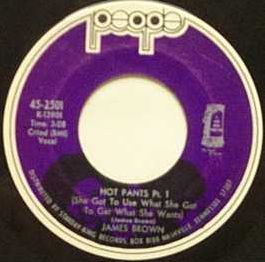
"Hot Pants " is a funk song by James Brown. Brown recorded the song in 1971 and released it that year as a three-part single on his People Records label, which was then distributed by his primary label King. It was a number-one R&B hit and reached number fifteen on the Billboard Hot 100 pop chart in the U.S. along with reaching number ten on the Cashbox magazine charts. "Hot Pants" was Brown's final release under King's purview before he moved to Polydor Records. The song's lyrics are an ode to the captivating power of the title garment, which members of the band first saw on their 1970 European tour.
"(I Love You) for Sentimental Reasons" is a popular song written by Ivory "Deek" Watson, founding member of the Ink Spots and of the Brown Dots, and William "Pat" Best, founding member of the Four Tunes.
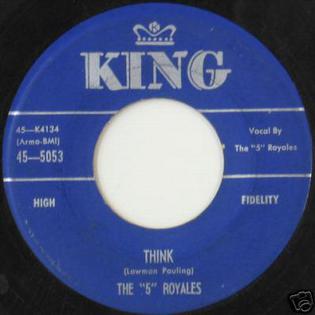
"Think" is a rhythm and blues song written by Lowman Pauling and originally recorded by his group The "5" Royales. Released as a single on King Records in 1957, it was a national hit and reached number nine on the U.S. R&B chart.

"Get on the Good Foot" is a funk song performed by James Brown. It was released in 1972 as a two-part single that charted #1 R&B and #18 Pop. It also appeared on an album of the same name released that year. Partly due to the unwillingness of Brown's record labels to certify sales of his previous hits, "Get on the Good Foot" was his first gold record. Billboard ranked it as the No. 99 song for 1972.
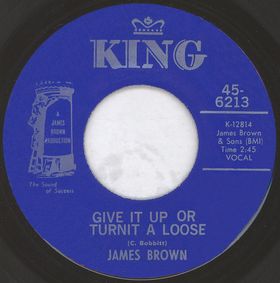
"Give It Up or Turnit a Loose" is a funk song recorded by James Brown. Released as a single in 1969, the song was a #1 R&B hit and also made the top 20 pop singles chart. "Give It Up or Turnit a Loose" appeared as an instrumental on the Ain't It Funky (1970) album, removing Brown's vocals and adding guitar overdubs, while the vocal version was released on It's a New Day – Let a Man Come In (1970).

"I Got the Feelin'" is a funk song by James Brown. Released as a single in 1968, it reached No. 1 on the R&B chart and #6 on the pop chart. It also appeared on a 1968 album of the same name.
"You Won't Be Satisfied " is a popular song.
"Bewildered" is a popular song written in 1936 by Teddy Powell and Leonard Whitcup. It was a 1938 hit for Tommy Dorsey and His Orchestra.

"Spinning Wheel" is a song from 1968 by the band Blood, Sweat & Tears, written by Canadian lead vocalist David Clayton-Thomas and appearing on their eponymous album.
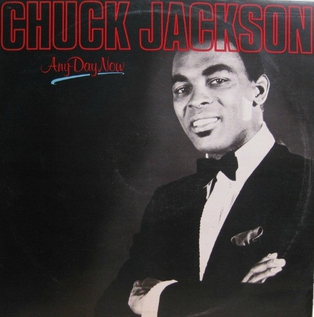
"Any Day Now" is a popular song written by Burt Bacharach and Bob Hilliard in 1962. It has been recorded by numerous artists over the years, including notable versions by Chuck Jackson in 1962, Alan Price in 1965, Elvis Presley in 1969, and Ronnie Milsap in 1982. The lyrics of this song predict the eventual demise of a romantic relationship the lyricist is in with an unnamed person whom the lyricist believes will get away one day and leave the lyricist with feelings of sadness and emptiness for the rest of his/her life.
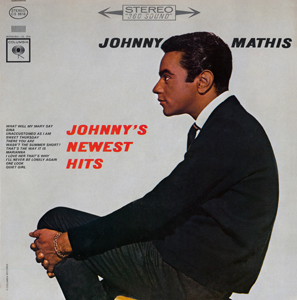
Johnny's Newest Hits is a compilation album by American pop singer Johnny Mathis that was released by Columbia Records on February 25, 1963, and includes the A- and B-sides of six of his singles.

Christmas Eve with Johnny Mathis is the fourth Christmas album by American pop singer Johnny Mathis that was released on September 23, 1986, by Columbia Records. This was Mathis's fourth holiday-themed LP and focused exclusively on secular material.
"Down and Out in New York City" is a song written by Bodie Chandler and Barry De Vorzon and recorded by James Brown. It appears in the film Black Caesar and is included on the film's soundtrack album. The song was co-arranged by Fred Wesley. It was released as a single in 1973 and charted #13 R&B and #50 Pop.

The Best Days of My Life is an album by American pop singer Johnny Mathis that was released on January 29, 1979, by Columbia Records and scaled back considerably on his more than decade-long practice of recording recent hit songs by other artists. He did, however, cover two standards: "As Time Goes By" and "Begin the Beguine", the latter of which is given a disco arrangement.
References
- ↑ White, Cliff (1991). "Discography". In Star Time (pp. 54–59) [CD booklet]. New York: PolyGram Records.
- ↑ Whitburn, Joel (2013). Joel Whitburn's Top Pop Singles, 14th Edition: 1955-2012. Record Research. p. 115.